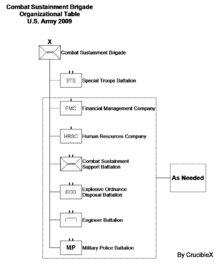Sustainment Brigades in the United States Army
As part of the early 21st century transformation of the United States Army from a division-based structure to a brigade-based army; the division support commands, corps support groups, and area support groups were inactivated and transformed to sustainment brigades (previously called sustainment units of action (SUS or SUA).

The sustainment brigade is designed to provide mission command for combat support and combat service support units. It can be adjusted in size to support anywhere from one to ten brigade combat teams (BCTs). A sustainment brigade has a joint capability that allows the Army to better manage the flow of logistics into the area of operations (AO) and provides support to other services for common logistics like fuel, common ammo, medical supplies, repair parts of wheeled vehicles, and so forth. A sustainment brigade is designed to operate independently in a theater of operations, in conjunction with other sustainment brigades under the command of a sustainment command (expeditionary), or directly under a theater sustainment command. When in theater, a sustainment command (expeditionary) will report to the theater sustainment command.
As of the last published information, there will be 31 sustainment brigades; 10 active duty brigades as part of the Army's active divisions, 2 independent active duty brigades, 10 Army National Guard brigades and 9 US Army Reserve brigades.[1]
Independent Sustainment Brigades
Divisional Sustainment Brigades
References
- Unit Designations in the Army Modular Force Archived 2007-10-26 at Archive-It, US Army Center of Military History. Retrieved 06-25-2008.